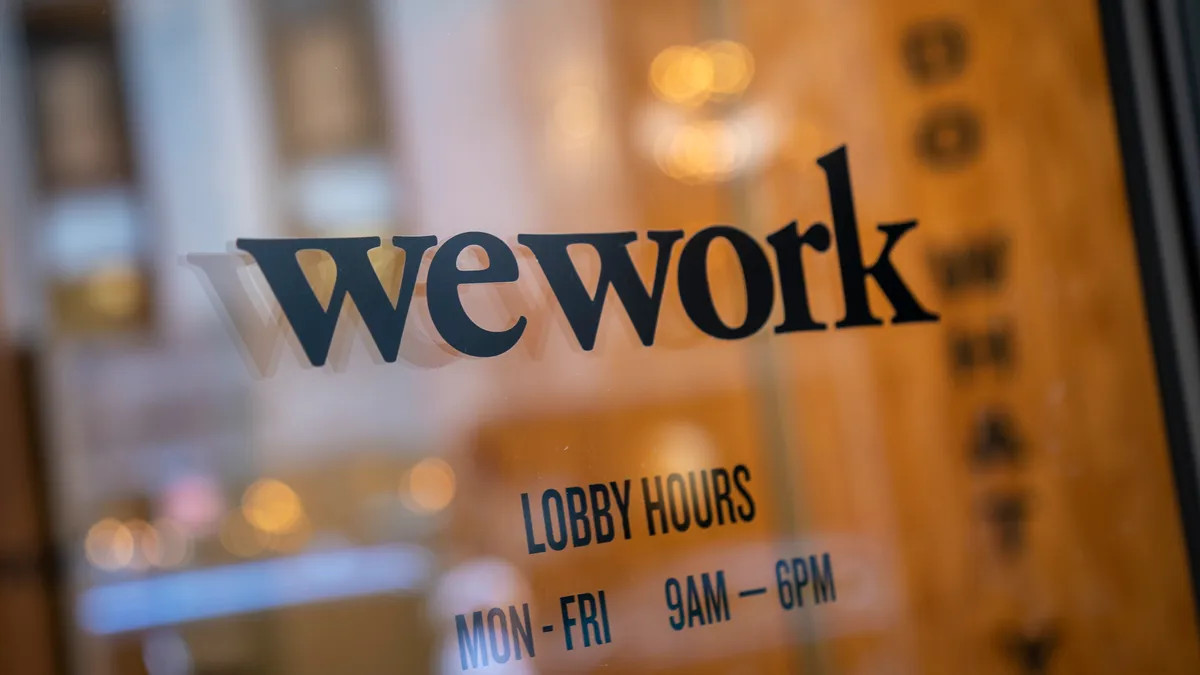WeWork filed for Chapter 11 bankruptcy protection Monday, telling a New Jersey federal court that it intends to trim “non-operational” leases. The company seeks court approval to reject 69 commercial real estate leases that it says are “underperforming.”
The company reported liabilities between $10 billion and $50 billion, according to the initial filing. It has entered into a restructuring support agreement with approximately 92% of its secured noteholders to “drastically reduce” its existing funded debt and “expedite the restructuring process,” WeWork said in a Nov. 6 press release.
In a video message on WeWork’s website, CEO David Tolley said that the bankruptcy filing, together with the RSA, provide “exceptional confidence” that WeWork will “exit this process no later than the second quarter of next year.”
The bankruptcy filing and reorganization follow the flexible office space firm’s massive expansion, in which it signed hundreds of long-term office leases “at the top of the market in the late 2010s,” the Wall Street Journal reported. As the pandemic drastically reduced demand for office space, WeWork was left with many unprofitable locations. Over half of the 69 underperforming leases it seeks court approval to reject are in New York, the Journal said. WeWork said it is in active negotiations with more than 400 landlords to amend existing leases.
The meltdown has the potential to impact several building service providers, including Cushman & Wakefield, which invested $150 million in WeWork when it went public at an $8 billion valuation. That investment coincided with an exclusive strategic partnership which saw Cushman provide operations to WeWork’s offices and gave owners the ability to integrate WeWork into their portfolios. At the end of the first quarter, Cushman’s equity in the company was valued at just $3.8 million; it is listed in the filing as holding $2.5 million of unsecured debt.
In response to a question about WeWork’s potential bankruptcy during its Q3 earnings call, Cushman & Wakefield CFO Neil Johnston said he does not anticipate that a bankruptcy filing will significantly affect its business. “Many of those spaces still need to get serviced, managed, or have something to get cleaned. It’s an essential service, so we don’t see it as a material impact to the company,” he said.
Research JLL released in August found that most markets have marginal exposure to WeWork, with high-exposure markets including New York City, Seattle, San Francisco, and Washington, D.C. JLL noted that WeWork occupies less than 1% of U.S. office inventory overall and that the company’s performance “does not pose a material or systematic threat to the overall market.”
As part of the proposed reorganization plan, WeWork said most of its existing shares would be deemed worthless, except those held by Softbank. The Tokyo-based investment holding company, which holds more than 50% of WeWork’s common shares, valued the startup at $47 billion at its peak. SoftBank will instead cancel its existing debts and retain its existing shares, WeWork said.
More than 400 other corporate entities affiliated with WeWork filed for bankruptcy on Monday. WeWork filed a motion with the court to combine all of these cases to be managed as a single bankruptcy proceeding, the Wall Street Journal reported.














